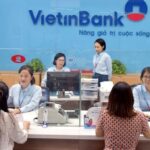
Experts emphasize the importance of a robust data system as the core of this model. The center’s most valuable asset is its data, which requires proper identification and coding. Photo: Quynh Danh. |
Decision 110, issued by the Ministry of Construction in February, outlined key tasks for implementing the Prime Minister’s directives on streamlining the real estate market and promoting social housing development. One of the focal points is the proposal for a pilot project titled “Center for Real Estate and Land Use Rights Transactions under State Management.”
Six Policy Groups for the Pilot Project
According to the Ministry of Construction’s proposal, the provincial-level Center for Real Estate and Land Use Rights Transactions will operate through a one-stop-shop mechanism, leveraging 4.0 technology to provide convenience to citizens and enterprises.
Once both parties reach an agreement and complete the necessary paperwork, the buyer and seller can access the center’s online portal to submit their information and request a name transfer. The application is then forwarded to three competent authorities for online processing, each handling specific functions.
After two business days of processing, upon receiving approval, the buyer can schedule an appointment at the center to immediately obtain the certificate of real estate ownership.
At a recent meeting on the project’s deployment, Mr. Vuong Duy Dung, Deputy Director of the Housing and Real Estate Market Management Bureau (under the Ministry of Construction), shared that the draft comprises six groups of pilot mechanisms and policies. These encompass policies on the center’s establishment, functions and tasks, transaction procedures, data connectivity and sharing, database construction and management, and physical infrastructure, resources, and implementation.
Dr. Nguyen Van Dinh, Chairman of the Vietnam Real Estate Brokers Association (VARS), underscored the critical aspect of a robust data system. He emphasized that the center’s most valuable asset is its data, which necessitates proper identification and coding.
Therefore, he highlighted the importance of prioritizing the development of a comprehensive data center to facilitate future control over real estate transactions. Properties without proper identification would be deemed illegal.
A Revolution in the Real Estate Sector
Deputy Minister of Construction, Mr. Nguyen Van Sinh, directed that the scope of real estate types included in this transaction center should be expanded. He also emphasized the importance of gathering practical experience from local administrative centers.
The Deputy Minister called for a shift in mindset, advocating for the establishment of an interconnected transaction system that transcends regional boundaries. This would enable convenient real estate transactions regardless of geographical location.
“The development of this project will revolutionize the real estate sector,” affirmed Deputy Minister Nguyen Van Sinh. “It is also a product of the Ministry of Construction’s program for scientific and technological development, innovation, and digital transformation.”

The pilot project “Center for Real Estate and Land Use Rights Transactions under State Management” aims to revolutionize the real estate sector. Photo: Quynh Danh.
|
Acknowledging that the proposal requires further refinement and completion, the Deputy Minister assigned the Housing and Real Estate Market Management Bureau to collaborate with relevant units to review the roadmap and highlight the political, legal, and practical justifications. Additionally, they should conduct an in-depth analysis of the current state of real estate transactions, pinpointing existing limitations and consequences.
Furthermore, the draft should incorporate international experiences, including separate reports on global models, practical transaction processes, and approaches. Based on this analysis, the proposal should offer perspectives and solutions to address the identified issues. The tasks should be assigned clearly and practically, avoiding theoretical complexities.
“This project will also serve as a foundation for developing, applying, and managing real estate transaction activities that align with practical needs, reducing administrative procedures, execution time, and costs for citizens and businesses,” added Deputy Minister Nguyen Van Sinh. “It will also propel the development of the digital industry, contributing to enhanced transparency in the market…”
Lien Pham
– 20:41 21/05/2025
Unlocking Property Ownership: Clearing the Path for Over 71,000 Homeowners in Ho Chi Minh City
After 6 months of operation, the Task Force has successfully addressed issues and facilitated the certification process for 97 out of 142 projects. This has resulted in the delivery of 71,418 residential units, including apartments, houses, land lots, officetels, and shops, as well as over 888 other real estate products, to the Ho Chi Minh City market.
“Proposed Property Tax on Stalled and Vacant Properties: A Study”
“Vice Prime Minister Tran Hong Ha has proposed a study on imposing taxes on idle land, as well as on real estate projects and housing developments that are delayed or stagnant. This proposal aims to address the issues of land speculation and stagnant development, encouraging more efficient use of land resources and promoting a vibrant and sustainable real estate market in Vietnam.”
The Great Bank Branch Shake-up: What Happened to the 42 VietinBank, Sacombank, and SCB Offices?
“The Chairman of VietinBank emphasized that VietinBank would be the first among the large state-owned capital group to undertake this endeavor.”





















